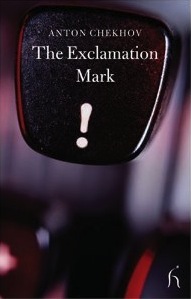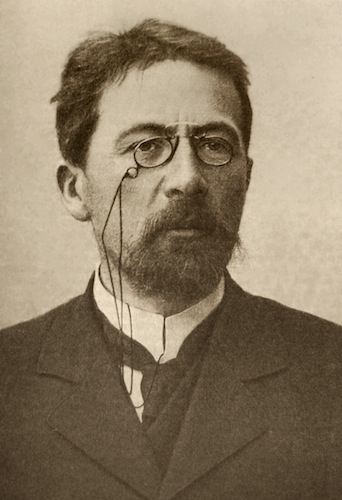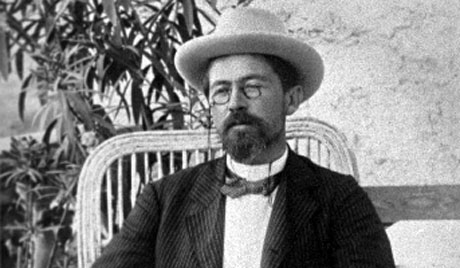
photo by Divine Harvester
Dan Powell recommends
Anton Chekhov’s The Exclamation Mark
I came to Chekhov late. Despite reading many of the great Russian authors in my teens to early twenties, and becoming particularly obsessed with Dostoyevsky, I’m afraid I refrained from diving into Chekhov’s fiction for two reasons. Firstly, his focus upon the shorter form did not appeal to me at the time – my interest being focused too intently, if not a little pretentiously, upon the novel. Secondly, and most importantly, there were so many collections and stories it was almost impossible to work out where best to begin. It is only in the last few years, since I began studying fiction writing, that my eyes have been opened to Chekhov, both as a reader and a writer. Indeed, I have devoured numerous collections of his work, and am currently savouring his collected letters. But one collection of his writing, above all others, has compelled me to return to its pages again and again.
There are few books of short fiction that bear a more fitting title than Anton Chekhov’s The Exclamation Mark. It is a stand-out collection as a result of the singular approach of Rosamund Bartlett – editor, translator and Chekhov biographer. The stories presented in this slim volume were written during a particularly formative six-month period in Chekhov’s writing life, all of them published between December 1885 and June 1886, and Bartlett presents them in the order of composition. As such, it becomes the rarest of short fiction collections, one that does not invite but rather demands that the reader take each story in turn. To flit about from story to story in this collection is to miss the point. To read them in order is to watch a talent develop in real time.
 What struck me, reading this collection for the first time, was its playfulness. Half the stories collected in The Exclamation Mark were originally published in Fragments (Oskolki), the popular comic weekly of the period – from the surreal title story, in which a man is pursued by an exclamation mark as he struggles to recall how to use one, to the throwaway comedy of ‘New Year Martyrs’, and the simple satire of ‘Conversation between a Drunkard and a Sober Devil’. In addition, many of the stories in this collection are described by Bartlett in her introduction as ‘frivolous to the point of being quite ridiculous’ (specifically ‘On The Telephone’, ‘The Rook’, ‘The Literary Table of Ranks’ and ‘A Tale’). Yet they earn their place, providing contrast and insight into the more serious work that is beginning to emerge. The inclusion of these shorter pieces gives the collection a contemporary feel, as many conform to the modern idea of flash fiction – playing with form and tone in a manner that would not be out of place in contemporary literary journals. As with most things concerning the short form, it seems Chekhov had it covered.
What struck me, reading this collection for the first time, was its playfulness. Half the stories collected in The Exclamation Mark were originally published in Fragments (Oskolki), the popular comic weekly of the period – from the surreal title story, in which a man is pursued by an exclamation mark as he struggles to recall how to use one, to the throwaway comedy of ‘New Year Martyrs’, and the simple satire of ‘Conversation between a Drunkard and a Sober Devil’. In addition, many of the stories in this collection are described by Bartlett in her introduction as ‘frivolous to the point of being quite ridiculous’ (specifically ‘On The Telephone’, ‘The Rook’, ‘The Literary Table of Ranks’ and ‘A Tale’). Yet they earn their place, providing contrast and insight into the more serious work that is beginning to emerge. The inclusion of these shorter pieces gives the collection a contemporary feel, as many conform to the modern idea of flash fiction – playing with form and tone in a manner that would not be out of place in contemporary literary journals. As with most things concerning the short form, it seems Chekhov had it covered.
The period represented in this collection is widely considered to be a turning point in Chekhov’s development as a writer. In February of 1886, he published under his own name for the first time, with the tragi-comic story ‘The Requiem’. A month later, while Chekhov was still mostly known for his comic pieces, he received a letter from Dmitry Grigorovich, in which the eminent author counseled the young Chekhov to begin more serious work. Significantly, in response to Grigorovich, Chekhov describes himself as ‘a writer on the threshold of his career’, thanking the author for his kind praise and encouragement which ‘means more than any diploma’. He promises to begin taking his work more seriously, to take more time with his writing. A month later Chekhov published the emotive and atmospheric ‘On Easter Night’. With its compelling portrayal of the ferryman Ieronim, the story is clear evidence of Chekhov making good on his promise.
While many ascribe this change of attitude and tone in Chekhov’s work to his correspondence with Grigorovich (not least Lynne Truss in her foreward to the collection), this change was already on the horizon. In January of 1886, Chekhov published ‘Grief’ – often translated as ‘Misery’ in other collections, and my favourite Chekhov short. It is the story of Iona Potapov, a cabby who is consumed by grief over the death of his son and who is besieged by belligerent and unsympathetic customers. Over the course of the story, Iona makes many attempts to tell anyone who will listen of his sadness, which builds to a final, desperately beautiful and tragic scene. It is clear from the raw emotion of this story, and the delicate precision of the imagery, that Chekhov was already taking steps to move into more serious writing – before Grigorovich’s advice some weeks later.
Whatever the case, it seems inevitable that sooner or later Chekhov would make this leap. When he did, Chekhov did not forget the importance of humour. Indeed, many of the more serious stories in the collection manage to walk that most difficult of tightropes – the one strung between humour and heartbreak.
If comedy is indeed tragedy plus time, then Chekhov is a master of comic writing. This is evident in his subtle managing of plot, imagery and character in the tragi-comic description of Ieronim in ‘On Easter Night’ – in which the character bends himself ‘into a question mark’. It is in the perfectly timed dialogue of ‘Kids’, and in the equally tragic and absurd image of Iona spilling his heart out to his horse in ‘Grief’. In these stories, Chekhov displays a deep understanding of the ridiculous and heart-rending nature of human beings. He knows when to bring the funny, when to break the heart.
 By the close of this six-month period in Chekhov’s writing life, and by the close of this collection, we have the tender, love-struck farce of ‘Romance with a Double Bass’ rubbing shoulders with the subtle comic-tragedy of ‘Superfluous People’. ‘Romance with a Double Bass’ is the perfect argument against any portrayal of Chekhov as a dour Russian author. In the story, the character Smychkov is a love sick musician whose wife has recently run away with a bassoonist. He goes for a swim in the river, during which he spies and becomes smitten with a lady asleep on the bank, who has been fishing. Smychkov attaches a bouquet of wild flowers to her hook, but when he returns to where he left his clothes, he finds they have been stolen and only his double bass and top hat are waiting for him. In his shame, he decides to hide under a nearby bridge until nightfall. Meanwhile, the maiden awakes to find her fishing hook caught upon something (Smychkov’s bouquet) – she disrobes and dives in to the water to free it. When she returns to the bank, she too finds her clothes stolen and also decides to head to the bridge and wait until night before continuing home. The farce that follows plays like a period Carry On film – Smychkov hides from the maiden in the case of his double bass, then runs after a figure he assumes is the clothes thief. Yet the story manages to end on a simultaneously ridiculous and sympathetic image. The low comedy of the situation married to Smychkov’s inflated sense of propriety and responsibility, makes him both a figure of fun and someone to empathise with.
By the close of this six-month period in Chekhov’s writing life, and by the close of this collection, we have the tender, love-struck farce of ‘Romance with a Double Bass’ rubbing shoulders with the subtle comic-tragedy of ‘Superfluous People’. ‘Romance with a Double Bass’ is the perfect argument against any portrayal of Chekhov as a dour Russian author. In the story, the character Smychkov is a love sick musician whose wife has recently run away with a bassoonist. He goes for a swim in the river, during which he spies and becomes smitten with a lady asleep on the bank, who has been fishing. Smychkov attaches a bouquet of wild flowers to her hook, but when he returns to where he left his clothes, he finds they have been stolen and only his double bass and top hat are waiting for him. In his shame, he decides to hide under a nearby bridge until nightfall. Meanwhile, the maiden awakes to find her fishing hook caught upon something (Smychkov’s bouquet) – she disrobes and dives in to the water to free it. When she returns to the bank, she too finds her clothes stolen and also decides to head to the bridge and wait until night before continuing home. The farce that follows plays like a period Carry On film – Smychkov hides from the maiden in the case of his double bass, then runs after a figure he assumes is the clothes thief. Yet the story manages to end on a simultaneously ridiculous and sympathetic image. The low comedy of the situation married to Smychkov’s inflated sense of propriety and responsibility, makes him both a figure of fun and someone to empathise with.
‘Superfluous People’ has a similar mix of comedy and tragedy, but arrives there from the opposite direction. Here, Pavel Matveyich Zaikin, a member of the district court, heads to the dacha where his family is staying for the summer. He visits only on weekends, unable to afford more time there as he is busy working to pay for his family’s comfort – all of which he complains of to a red-trousered fellow traveller heading to the dachas for the same reason. Zaikin arrives home to find no welcome, nearly everyone is out, busy with theatre rehearsals and the like. Only his six-year-old son, Petya, is there to greet him. When the others finally arrive home, Zaikin finds he must sleep on the couch in his study, as his wife has invited friends to stay and has given away his bed. Unable to sleep, he takes a walk and soon comes across the red-trousered man from earlier, who has himself been ousted from his bed by visitors. Neither man admits their situation, choosing to explain their presence outside in the cold by saying they are ‘enjoying nature’. In his closing image of the two men, their beds usurped, desperately clinging to a tattered dignity and self-respect, Chekhov once again provides characters the reader can both laugh at and embrace.
The Exclamation Mark has much to reveal about Chekhov as a developing talent, and the part of me that loves Chekhov as a reader has been challenged and thrilled and nudged toward tears by the stories here. The young Chekhov covers, in a slim six months, a breadth and tone of subject matter that many writers would fail to cover in a lifetime. He shows us many levels of Russian society, from the lowly cabbie, to the monk, to the civil servant, to the masters of estates. He writes of the seasons and festivals, with tales of Christmas parties, New Year celebrations, tobogganing, and Easter night rituals. It is a slight book, running only just clear of 100 pages, yet it offers a depth beyond most collections many times its size.
As a final insight, The Exclamation Mark includes two versions of ‘A Little Joke’ – the original version published in March 1886, in Sverchok, and the second revised edition published in Rasskazy Vol 2, in 1900. Chekhov typically made only small alterations to his stories before the publishing of his collected work, yet here he makes quite dramatic revisions, changing both the ending and the overall tone of the story. His narrator is transformed from the self-assured, almost cocky suitor in the original, to a character of greater sensitivity in the redrafted version. The changes are so complete that Bartlett appends the later version so the reader might compare it to the original and so gain ‘a bird’s eye view of Chekhov’s path to creative maturity’.
The Exclamation Mark stands unique amongst the proliferation of Chekhov collections in print today. Through stories both familiar and those never previously translated into English, we are taken into the confidence of the young Chekhov and can follow his footsteps as he begins his journey – stumbling at first, then striding towards greatness. We glimpse a writer finding his voice, while hoping ‘that one day I shall manage to achieve something, although time is rushing by quickly’. It is a collection I wish had existed when I was younger and struggling with how to begin being a writer. It could have taught me lessons I have taken too long learning. As it is, I must be grateful that this collection exists at all, and embrace everything it has to show, including the many levels to be uncovered on subsequent re-readings. These stories stand on, and are themselves the very threshold of greatness – we get to watch as, before our very eyes, a good writer becomes great.



4 thoughts on “The Exclamation Mark”
Comments are closed.